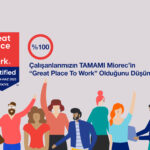World is changing, working habits are in a continuous change in the historical process depending on the professions and the types of production. The change is faster than expected, due to Covid-19 Pandemic that affect all of us around the globe.
With the effect of Covid-19 working habits, work-life balance and working spaces are rapidly changing even more than expected. The way of work has been changing and adapting to way to work wherever you are within the areas that can be implemented.
Office strategies are changing due to current pandemic status all over the world which deems to be a part of our lives for a while.
Co-working community spaces will be more needed and expanded than expected before the pandemic times with providing flexible and cost-effective solutions.
Historically, flexible workspace industry has a long history with its origins dating back to 1960s. In 1980s expanded as an alternative to traditional offices due to their flexibility, manageable cash flow and reduce long-term overheads. Rapid adoption of personal computers, internet usage and increasing data access speeds during 2000s helped flexible workspaces to cater wider range of needs of companies and opened up new opportunities to the industry. With its shorter lease terms and greater flexibility, flexible workspaces became a legitimate competition to traditional office spaces. After 2010, flexible workspace industry has become the one of the fastest growing sub segments of the global real estate market.
The services composed of three categories including Serviced Office, Virtual Office, and Collaborative Workspace.
Until now, the workspace industry is driven by 3 major trends: Growth in SMEs and start-ups: Increased business uncertainty, Globalized workforce and changing working practices.
Major factors, now adding the fact that all around the world business life is facing with Covid-19, companies need to adapt themselves quickly, start-ups shall re-think the office set-up and costs of office will be re-shaping.
According to the article of Jennifer Lue at CNBC Make It, in a post-pandemic economy, it’s possible only the biggest companies will have the budget to maintain headquarters, while businesses without the financial resources may scrap the idea of having a physical location altogether. Others may decentralize their physical presence and open regional hubs wherever their workers are located, whether that is in the suburbs, mid-sized cities or across the country entirely.
While the future remote workforce is expected to grow, many will still want a place to connect with others in person. Co-working and community spaces are uniquely positioned to fill the void.
Besides the financial benefits, from human resources perspective, there are numerous of researches explaining the benefits of co-working places which one article of John Muller at HR Technologists give brief summary on these researches and gathering the benefits into five categories which co – offices provide as;
- Happier and more productive employees,
- Expanded skillsets
- Widened social networks
- Increased work flexibility
- Better work life balance
In this light, in during pandemic economy co-working spaces will be more needed and expanded in terms of strategic financial office decision while maintaining employees secured, effective and engaged by the human resources perspective.
Providing cost effective and flexibility advantages to companies; Plaza Cubes is one of best practices. Local flexible workspace provider in Turkey offering flexible office solutions to entrepreneurs, freelancers, start–ups, SMEs and corporations, since 2006, offering companies a concept called workplace outsourcing, which enables them to rapidly seize new market opportunities because the office infrastructure is already in place, which is particularly beneficial when businesses are setting up offices. Each business center location includes a client-driven mix of offices, meeting rooms and common areas. An advanced communications system, network access and IT and administrative support are also standard features. Additionally, clients can utilize business services, including meeting rooms, video conferencing, business support services, and catering — on a pay-per-use basis.
Now expanding in Europe through their office space in Dusseldorf Hammer Strasse 19 with their years of know-how, experience, expertise, and energetic team.
We are proud to be a part of their community in Turkey as well as leading their recruitment activities in Düsseldorf.
Keywords: co-working space, recruitment, human resources, sharing, flexibility, re-function.
References / Related Articles:
“https://www.plazacubes.com/en/”
“https://www.cnbc.com/2020/05/04/how-co-working-spaces-could-succeed-in-the-post-pandemic-world.html”

Miorec İnsan Kaynakları / Co-Founder


